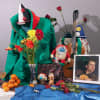The opening track on Parquet Court’s new album, Human Performance, is a nervous rumination on domesticity and the never-ending struggle to keep things in order. It sneaks in ignored, it stacks up around, it comes through the window, it comes through the floor, warns frontman Andrew Savage before issuing a command: Dust is everywhere—sweep.
The song is a fitting metaphor for modern life: the nagging persistence of clutter, the exhaustion inherent in trying to make order out of an always-encroaching chaos. For the past six years, the Brooklyn band Parquet Courts has methodically mined similar themes, fine-tuning their own peculiar vein of slack-rock as a means of pushing back against anxiety, romantic disaffection, and all manner of urban malaise. Across four full-length albums and two excellently weird EPs, the band has not only proven themselves to be critical darlings, but have seemingly tapped into the mindset of many a contemporary twentysomething—that of a well-intentioned fuck up who is smart enough to know better but still can’t help making a mess.
Though they can accurately be described as the band that launched a million Pavement references, it would be a shame if Parquet Courts had to linger under the shadow of Malkmus and co. for the duration of their career. Much like Pavement, there is a perceived insouciance about Parquet Courts that can be both endearing and maddening. They temper their razor-sharp pop instincts by flirting with jam-band noodling or, in the case of 2015’s Monastic Living EP, improvisational instrumentals that, while ostensibly interesting, still kind of resonate as a giant “fuck you” to anyone who might have fallen in love with the band via 2012’s “Stoned and Starving.” This, of course, is also what makes Parquet Courts a great, challenging band. Behind all the well-considered goofs and clouds of weed smoke, there is a nervous energy that frequently coalesces into near-perfect rock music. It’s just not always easy to tell if the band is struggling to embrace their own pop sensibilities or stubbornly trying to fight them.
Human Performance is arguably the best record Parquet Courts has ever made, largely because it strikes a variety of important balances. Not only does the album weigh catchy-as-all-hell pop songwriting against tracks that veer into the jagged punk territory, it also matches intellectual exercise with actual human feelings, which means it’s the first Parquet Courts record in which cleverness doesn’t trump sincerity. I told you I loved you, sings Savage on the album’s title track. Did I even deserve it when you returned it?. It’s a question at the very heart of Human Performance: what does it actually mean to be a feeling, grown-up human rather than simply running around pretending to be one? What does it mean to be worthy of someone else’s affection?
I recently met up with Andrew Savage at a restaurant in Brooklyn to talk about the new album and what it means to be a functioning, feeling person who also makes art and plays in a rock band. I never once got the sense that he was pretending.
There are records that really appeal to me in an emotional, sentimental way and there are records that appeal to me on an intellectual level, but it’s often hard for a record to do both simultaneously. Human Performance is the first Parquet Courts record that really succeeds on both levels. It’s very clever, but It’s also surprisingly emotional.
It’s a very tough thing to do. I've heard feedback that both of those things are something that draws people into the band. Up to this point, it's always been a bit more towards the cerebral end of things with just a touch of sentimentality. I think I was just at a point in my life [before] where that was what was coming out at me. That is what I could produce. A lot of my songs and Austin's songs—all of our songs, really—are kind of internal emotional responses. For Human Performance it just happened differently. I don't know who was following whose lead, or if it was just this wonderful thing where our hearts and minds just lined up at this special moment. That's just what was coming out of all of us. Honestly, it would be a pity to be too much of one or the other—too much of an intellectual or too much or a romantic. I find a big challenge in art is trying to balance those things.
This record definitely feels more personal in an obvious way than the previous ones.
Yeah. I think so. Maybe I just wasn't fully comfortable going certain places yet, you know? I think with each record I've grown a bit more as a songwriter. With Human Performance I became more comfortable being vulnerable. A lot of people have asked “Do you think is this your most personal album?” I don't necessarily think it's the most personal because they're all deeply personal, but this one for sure has a level of vulnerability. It was an uncomfortable record to write. Some of those songs are still uncomfortable to sing. And like I said, it was what was coming out of me. It's all I could really do. Now I have these songs that are uncomfortable. Not all of them, but a few of them are very uncomfortable. Now I’ve got to sing them because they're on the record, they're out there. That's a new challenge of being vulnerable in public. The songs are in the public domain now. We've played one on national TV a few weeks ago. So, that's new.
Intellect is something that you can hide your emotions with and you can hide behind. It can be just as damning as being overly saccharine because it can also be a façade. That's where the balance gets tough. I think emotional honesty is really a type of intelligence—and it's something that I haven't always been good at. I think a lot of the songs on this record are probably a result of the fact that I haven't actually been able to be emotionally honest in every aspect of my life.
“It was an uncomfortable record to write. Some of those songs are still uncomfortable to sing.”—Andrew Savage
It’s a part of growing up. You were 24 when you started this band and now you are 30. A person’s worldview—and their creative drive—changes pretty radically over those years.
I would agree. You know, I was in bands since I was 19. I did my first tour when I was 19. All very DIY, all very let's just get in the van and go kind of thing. My old band did a tour of Europe, which was my first time going to Europe. We were there for a month. Before that we were on tour in the U.S. for two months. I'd seen the whole U.S. and all of Europe in 3 months. Coming back to Denton [Texas] was really hard. The world was revealed as being so big, then I go back to this university town of 100,000 people and all of a sudden I realize how small my environment is. In Parquet Courts I've been to even more places, I've met even more people. The world has revealed itself in even more dramatic ways. That change that you're talking about is supplemented with something else, where the notion of home and your circle of friends becomes more abstract. Change happens at an accelerated rate. Everything changes. You start to feel it.
The subject of “the city” is a constant in your songs, particularly on this record. Do you think of Parquet Courts as being a New York City band?
We get asked that a lot because I think to a very large degree people still really romanticize New York. We get asked a lot to talk about our relationship with Television or Talking Heads or Velvet Underground or stuff like that. People try to kind of associate you with that because you live here. I would caution against that because those groups are very of their time. As a writer I think it's a bit dishonest not to address the moment that you live in. I don’t think it’s right to try and hark back to some sort of glory days that you didn't even experience yourself. I’m not into retroactive nostalgia. I mean, those bands are everybody's favorite bands that likes rock music. Of course those are influential things.
The influence I glean from [those bands] is less aesthetic and more of the fact that these were artists that were very in and of the moment in which they were around. I think that that's admirable. That's something that probably was one of the lessons I learned from doing Content Nausea—you need to talk about things that are happening right now, like technology and the way that it's changed us and what it means to live an urban existence these days. Living in New York doesn't mean the same thing as when Lou Reed was living in New York, or when a lot of my favorite hardcore bands from the ’80s were around in New York. It's a totally different world. You have to reflect your own time and you have to address the world that you are actually living in.
I love the idea of human performance—this notion that everything is performance, that we’re just walking around sort of trying to mimic and behave in the way we think people are supposed to behave. I’m fascinated by how much of our behavior as people is really just some weird affectation we adopt in order to be around other people.
Yes. Especially being a performer of sorts it might be people's inclination to assume I'm talking about on-stage performance—but no, I'm talking about more about everyday moments than playing in a band and how that “performance” affects people in your life. These are questions I maybe should have asked myself a lot earlier in life, but I don't know. Maybe part of the nature of living this band life is that it's stunted my growth.
I remember seeing you guys for the first time—2013 maybe?—and I recall that there was something very inscrutable about it. As a front person, you were sort of unreadable. It can come off as being incredibly serious or just sort of bratty.
People have interpreted it as both, actually, when really it's neither. It's hard. I've never been good at small talk on stage. I'm trying to get better. I know that I talk funny or maybe a little bit flat. It's not what I hear in my head, but I'm cognizant that people associate that with maybe being distant or aloof, which is something I'm honestly trying to work on. I guess our mentality has always been to just play the songs, which I've become more comfortable with it for sure. I think especially at the beginning it might have even worked in our favor. We almost had a no stage banter rule, just to into the next song immediately, just keep it going. Now things are changing. I guess I'm learning how to be, I don't know, more public—like I've been talking about.
In can definitely work in your favor. I guess it just feels funny when I can’t tell if the performer is actually enjoying themselves or not.
I've had people ask me a lot: “Did you have fun up there?” “Why are you so pissed off?” “Why aren't you having a great time?” That's what got me thinking about how it is relatively important to perform more, to try a bit harder. In both life and in art, I don't think “performance” is something that is necessarily...it doesn't necessarily mean something is inauthentic. I think a lot of times the actual performance becomes something to help you relate to somebody else, which is something I've struggled with: the ability to express emotions in day to day conversations, particularly with people I don’t know very well.
I think that's one of the reasons why music and art have been so important for me, because self-expression just feels more natural there. Maybe I'm more on the end of the spectrum where it feels uncomfortable in a moment just interfacing with someone. My mentality regarding performing has always been ‘this is just how I do this’, but people always ask for more. They want a persona, which I'm not exactly comfortable with. I'd rather just be myself. I'm just working on how to be myself but also give people that thing that they want from my music or my art. I’m still figuring out how to give people more.


